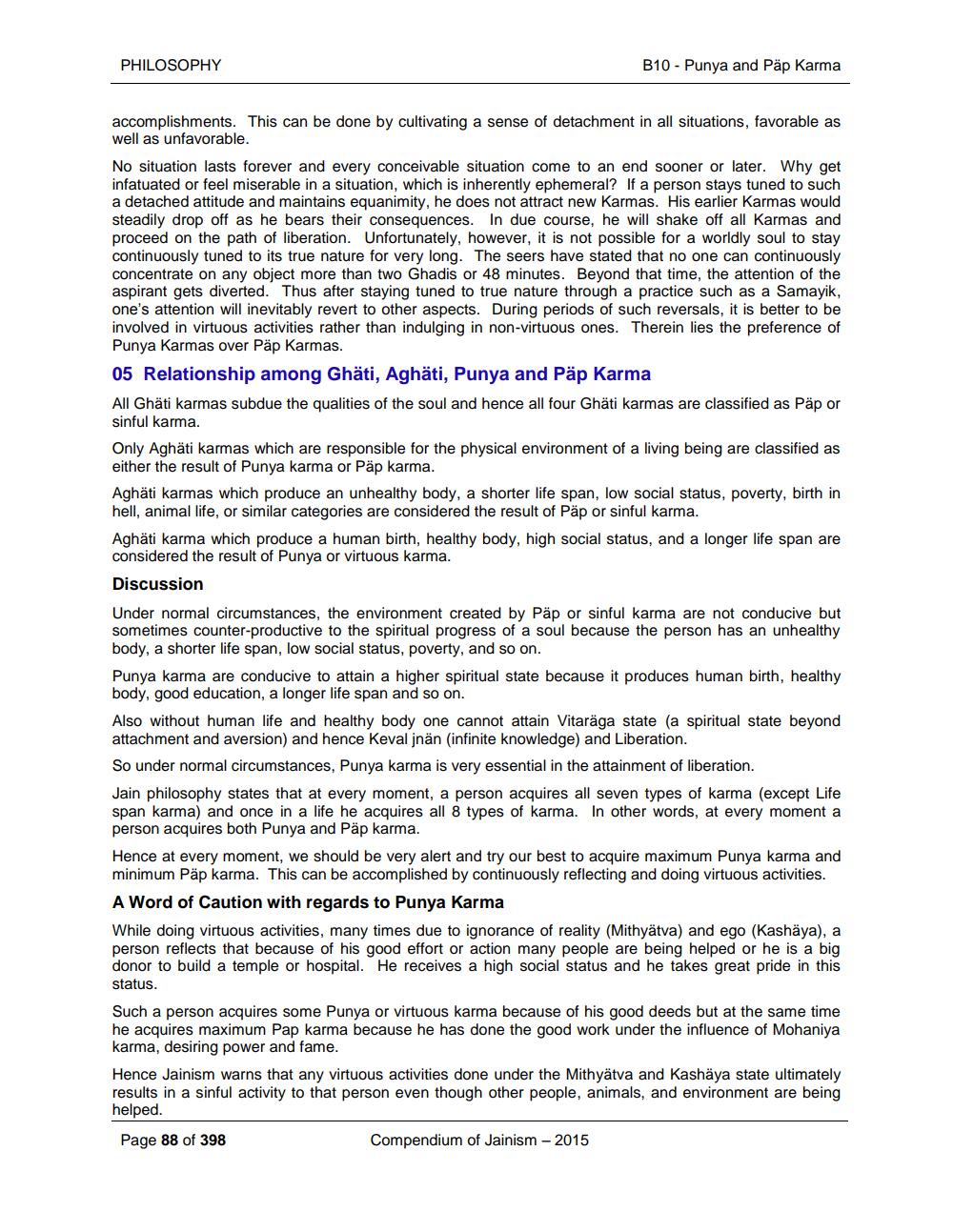________________
PHILOSOPHY
B10 - Punya and Päp Karma
accomplishments. This can be done by cultivating a sense of detachment in all situations, favorable as well as unfavorable.
No situation lasts forever and every conceivable situation come to an end sooner or later. Why get infatuated or feel miserable in a situation, which is inherently ephemeral? If a person stays tuned to such a detached attitude and maintains equanimity, he does not attract new Karmas. His earlier Karmas would steadily drop off as he bears their consequences. In due course, he will shake off all Karmas and proceed on the path of liberation. Unfortunately, however, it is not possible for a worldly soul to stay continuously tuned to its true nature for very long. The seers have stated that no one can continuously concentrate on any object more than two Ghadis or 48 minutes. Beyond that time, the attention of the aspirant gets diverted. Thus after staying tuned to true nature through a practice such as a Samayik, one's attention will inevitably revert to other aspects. During periods of such reversals, it is better to be involved in virtuous activities rather than indulging in non-virtuous ones. Therein lies the preference of Punya Karmas over Päp Karmas.
05 Relationship among Ghäti, Aghäti, Punya and Päp Karma
All Ghäti karmas subdue the qualities of the soul and hence all four Ghäti karmas are classified as Päp or sinful karma.
Only Aghäti karmas which are responsible for the physical environment of a living being are classified as either the result of Punya karma or Päp karma.
Aghäti karmas which produce an unhealthy body, a shorter life span, low social status, poverty, birth in hell, animal life, or similar categories are considered the result of Päp or sinful karma.
Aghäti karma which produce a human birth, healthy body, high social status, and a longer life span are considered the result of Punya or virtuous karma.
Discussion
Under normal circumstances, the environment created by Päp or sinful karma are not conducive but sometimes counter-productive to the spiritual progress of a soul because the person has an unhealthy body, a shorter life span, low social status, poverty, and so on.
Punya karma are conducive to attain a higher spiritual state because it produces human birth, healthy body, good education, a longer life span and so on.
Also without human life and healthy body one cannot attain Vitaräga state (a spiritual state beyond attachment and aversion) and hence Keval jnän (infinite knowledge) and Liberation.
So under normal circumstances, Punya karma is very essential in the attainment of liberation.
Jain philosophy states that at every moment, a person acquires all seven types of karma (except Life span karma) and once in a life he acquires all 8 types of karma. In other words, at every moment a person acquires both Punya and Päp karma.
Hence at every moment, we should be very alert and try our best to acquire maximum Punya karma and minimum Päp karma. This can be accomplished by continuously reflecting and doing virtuous activities.
A Word of Caution with regards to Punya Karma
While doing virtuous activities, many times due to ignorance of reality (Mithyätva) and ego (Kashaya), a person reflects that because of his good effort or action many people are being helped or he is a big donor to build a temple or hospital. He receives a high social status and he takes great pride in this status.
Such a person acquires some Punya or virtuous karma because of his good deeds but at the same time he acquires maximum Pap karma because he has done the good work under the influence of Mohaniya karma, desiring power and fame.
Hence Jainism warns that any virtuous activities done under the Mithyätva and Kashaya state ultimately results in a sinful activity to that person even though other people, animals, and environment are being helped.
Page 88 of 398
Compendium of Jainism - 2015




